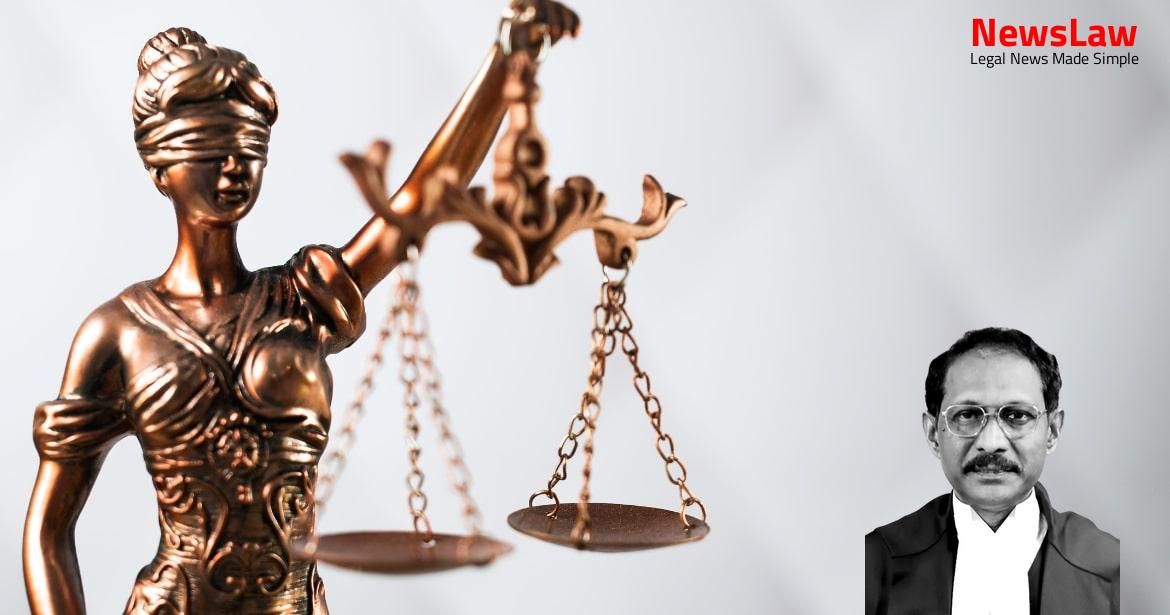Explore a comprehensive legal analysis of a recent court judgment regarding convictions and acquittals in a high-profile terrorism case. The court’s meticulous examination of evidence, interpretation of laws, and determination of guilt or innocence offer valuable insights into the complex world of criminal justice and national security. Dive into the details to understand the nuances of the legal proceedings and the principles guiding the court’s decision-making process.
Facts
- A large number of incriminating materials were recovered from the accused individuals, including detonators, gelatin sticks, hand grenades, explosive substances, and other related items.
- Senior LeT leaders were actively involved in motivating individuals for Jihad activities through provocative speeches during 1999.
- Accused individuals were found to be conspiring to cause bomb blasts and other terrorist activities in various parts of Karnataka, leading to the registration of multiple FIRs under different sections of the law.
- The accused were associated with banned militant organizations like LeT and were actively recruiting and training individuals for terrorist acts.
- The investigation involved multiple arrests, recoveries, and the submission of charge sheets against the accused persons.
- Abdul Rehman played a significant role in recruiting and instructing individuals like Afsar Pasha and Mehboob Ibrahim for carrying out terrorist activities in Karnataka.
- Several recoveries of explosive materials, weapons, and incriminating documents were made based on the voluntary statements of the accused.
- The accused individuals were found to be in contact with senior LeT leaders based in Saudi Arabia and Bangladesh, indicating a larger conspiracy to wage war against the Indian government.
- Accused persons A2, A3, and A4 acquitted for the offence under section 25 and 26 of the Arms Act.
- A-1 sentenced to undergo 3 years of Simple Imprisonment (S.I.) for the offence under section 26 of the Act.
- High Court modified the conviction and sentence of the Accused as follows: A-1, A-2, A-4, and A-5 sentenced to life imprisonment, A-2 and A-4 also sentenced to additional years, A-3 sentenced to 7+1 years, A-6 sentenced to life imprisonment and 7+1 years, A-7 was acquitted as per Trial Court’s decision.
- Four appeals filed by A-5, A-6, A-1, and A-4 to challenge the High Court’s judgment.
- State did not file any appeal against the acquittal of A-7 or other Accused acquitted of some charges.
- Criminal Appeal Nos. 530-531 of 2012 were filed by the State against the acquittal of the Accused including A-7 and against the lesser sentences imposed in cases with convictions.
- High Court heard all four appeals together.
Also Read: Balancing Power and Transparency: Electoral Bonds Struck Down, Disclosure Mandated
Arguments
- The appellant’s counsel argued that the appellant is entitled to raise all questions during the final hearing, including the argument for acquittal.
- The Court’s exercise of jurisdiction under Article 142 of the Constitution allows it to pass decrees and make orders necessary for complete justice in any pending case.
- The Court is not restricted by any previous directions given at the time of issuing notices, as long as there is no express provision of law preventing it.
- Orders given by the Court at the time of admitting a petition do not have the status of an express provision of law.
Also Read: Recall of Resolution Plan Approval: Legal Analysis
Analysis
- Section 121 of the IPC deals with waging war against the Government of India.
- Section 121-A covers conspiracy to commit offences punishable under Section 121.
- The offence under Section 121-A includes conspiring to overawe the Central or State Government by criminal force.
- It is not necessary for any illegal act to take place in pursuance of the conspiracy to constitute an offence under Section 121-A.
- The decision in Mir Hasan Khan v. State is relevant in determining what acts do not constitute waging of war.
- The offence of waging war in the context of the IPC was examined, emphasizing the need for a high degree of probability in establishing the facts.
- Insurrection, rebellion, and civil wars are offenses that can be considered as waging war.
- The target chosen for an act of war plays a significant role in determining the nature of the offense.
- The presence of sophisticated arms and explosives with a clear intent to imperil the safety and functioning of the government can indicate waging war.
- The idea of ‘waging war’ requires unity of purpose and a meeting of minds among conspirators to commit illegal acts.
- The burden of proof, sufficiency, and weight of evidence are crucial factors in determining the guilt in cases of waging war.
- Activities at the stage of conspiracy should be stopped immediately.
- Courts should not wait for damage to occur before taking action.
- No merit found in the appeals of the Accused, thus all appeals are dismissed.
Decision
- Accused A2, A3, A4, and A6 sentenced to 7 years of simple imprisonment and a fine of Rs. 5,000 for offenses under section 5 of the Explosive Substances Act 1908.
- Judgment of conviction and sentence for A2, A3, A4, and A6 under section 5 of the Explosive Substances Act 1908 is set aside.
- Judgment of acquittal for Accused No. 7 is confirmed.
- Sentences of imprisonment to run concurrently.
- Accused sentenced to rigorous imprisonment for life and a fine of Rs. 5,000 for the offense under Section 121-A of IPC.
- Enhancement of sentence confirmed for Accused No. 3 under Section 121-A of IPC.
- Accused A1 to A6 acquitted of charges under Section 121 and 120B of IPC.
- Accused No. 3 acquitted of charges under section 121-A of IPC.
- Appeal filed by the State in Crl. A.No.531/2012 dismissed.
- Accused A-1, A-2, A-4 to A-6 convicted for the offense under Section 121-A of IPC.
- Accused No. 1 and 5 acquitted of charges under section 6 of the said Act.
- Accused No. 6 convicted for the offense under sections 25 and 26 of the Arms Act and sentenced to 5 years of simple imprisonment and a fine of Rs. 5,000.
- Accused No. 3 to be released as he has already undergone the imposed period of imprisonment.
Case Title: MOHAMMAD IRFAN Vs. STATE OF KARNATAKA (2022 INSC 664)
Case Number: Crl.A. No.-000201-000202 / 2018



